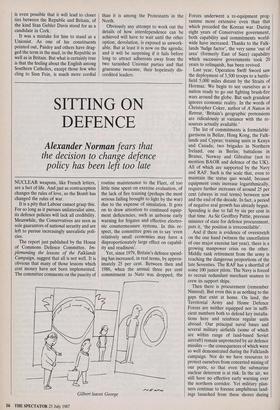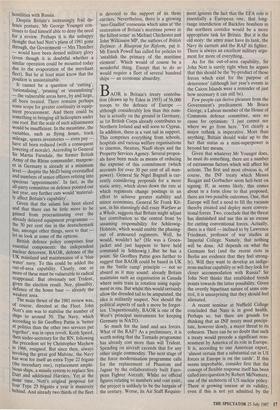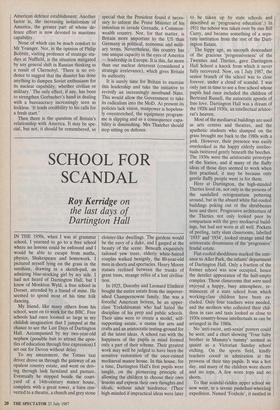SITTING ON DEFENCE
Alexander Norman fears that the decision to change defence policy has been left too late
NUCLEAR weapons, like French letters, are a fact of life. And just as contraception changes the rules of love, so the Bomb has changed the rules of war.
It is a pity that Labour cannot grasp this. For so long as it pursues unilateralist aims, its defence policies will lack all credibility. Meanwhile, the Conservatives are seen as sole guarantors of national security and are left to pursue increasingly unrealistic poli- cies.
The report just published by the House of Commons Defence Committee, Im- plementing the lessons of the Falklands Campaign, suggest that all is not well. It is obvious that many of those lessons which cost money have not been implemented. The committee comments on the paucity of routine maintenance to the Fleet, of too little time spent on exercise evaluation, of the lack of fire training (perhaps the most serious failing brought to light by the war) due to the expense of simulation. It goes on to draw attention to continued equip- ment deficiencies, such as airborne early warning for frigates and effective electro- nic countermeasure systems. In this re- spect, the committee goes on to say `even relatively small economies may have a disproportionately large effect on capabil- ity and readiness'.
Yet, since 1979, Britain's defence spend- ing has increased, in real terms, by approx- imately 25 per cent. Between then and 1986, when the annual three per cent commitment to Nato was dropped, the Gilbert leaves George Forces underwent a re-equipment prog- ramme more extensive even than that which preceded the Korean war. During eight years of Conservative government, both capability and commitments world- wide have increased. Thanks to the Falk- lands 'fudge factor', the very same 'out of area' (formerly East of Suez) capability which successive governments took 20 years to relinquish, has been revived.
Last year, Operation Swift Sword saw the deployment of 3,500 troops to a battle- field 5,000 miles distant by the Straits of Hormuz. We begin to see ourselves as a nation ready to go out fighting brush-fire wars around the globe. But such grandeur ignores economic reality. In the words of Christopher Coker, author of A Nation in Retreat, 'Britain's geographic pretensions are ridiculously at variance with the re- sources actually available.'
The list of commitments is formidable: garrisons in Belize, Hong Kong, the Falk- lands and Cyprus; training units in Kenya and Canada; two brigades in Northern Ireland, one in Berlin; battalions in Brunei, Norway and Gibraltar (not to mention BAOR and defence of the UK). All of which are supported by the Navy and RAF. Such is the scale that, even to maintain the status quo would, because equipment costs increase logarithmically, require further increases of around 25 per cent (always in real terms) between now and the end of the decade. In fact, a period of negative real growth has already begun. Spending is due to fall by six per cent in that time. As Sir Geoffrey Pattie, previous minister of state for defence procurement, puts it, 'the position is irreconcilable'.
And if there is evidence of overstretch on the one hand (witness the cancellation of one major exercise last year), there is a growing manpower crisis on the other. Middle rank retirement from the army is reaching the dangerous proportions of the late Seventies. The RAF has a shortfall of some 100 junior pilots. The Navy is forced to recruit redundant merchant seamen to crew its support ships.
Then there is procurement (remember Nimrod). But even this is as nothing to the gaps that exist at home. On land, the Territorial Army and Home Defence Forces are neither equipped nor in suffi- cient numbers both to defend key installa- tions here and reinforce regular units abroad. Our principal naval bases and several military airfields (some of which are within range of land-based Soviet aircraft) remain unprotected by air defence missiles — the consequences of which were so well demonstrated during the Falklands campaign. Nor do we have resources to protect ourselves from concerted mining of our ports, so that even the submarine nuclear deterrent is at risk. In the air, we still have no effective early warning over the northern corridor. Yet military plan- ners continue to foresee amphibious land- ings launched from these shores during hostilities with Russia.
Despite Britain's increasingly frail de- fence posture, Mr George Younger con- tinues to find himself able to deny the need for a review. Perhaps it is the unhappy thought that had Nott's plans of 1981 gone through, the Government — Mrs Thatcher — would have been denied military glory (even though it is doubtful whether a similar operation could be mounted today due to the evaporation of the merchant fleet). But he at least must know that the position is unsustainable.
It cannot be a question of 'cutting', `rationalising', 'printing' or 'streamlining' — the vulnerable areas have, by and large, all been treated. There remains perhaps some scope for greater continuity in equip- ment procurement. And there could be something in bringing all helicopters under one roof. But the scale of such adjustments would be insufficient. In the meantime, the variables, such as flying hours, track mileage, spares inventories — even pay have all been reduced (with a consequent lowering of morale). According to General Sir Martin Farndale, the former British Army of the Rhine commander, manpow- er in Germany is already at a minimum level — despite the MoD being overstaffed and numbers of senior officers retiring into specious 'appointments'. In fact, as the all-party committee on defence pointed out last year, any further cuts would `material- ly affect Britain's capability'. Given that the salami has been sliced and that there can be little more to be gained from procrastinating over the already delayed equipment programme the 30 per cent rise in the deutschemark has, amongst other things, seen to that let us look at some of the options. British defence policy comprises four essential components: the independent nuclear deterrent, BAOR, defence of the UK mainland and maintenance of a `blue water' navy. To this could be added the out-of-area capability. Clearly, one or more of these must be vulnerable to radical reappraisal. But obviously not Trident, given the election result. Nor, plausibly, defence of the home base — already the weakest area.
The main thrust of the 1981 review was, of course, directed at the Fleet. John Nott's aim was to stabilise the number of ships to around 50. The Navy, which according to Sir Geoffrey Pattie is 'better at politics than the other two services put together', was in open revolt. Keith Speed, then under-secretary for the RN, following the precedent set by Christopher Mayhew in 1966, resigned. But since then, always invoking the great god Malvine, the. Navy has won for itself an extra Type 22 frigate (the incendiary one), replacement amphi- bious ships, a missile system to replace Sea Dart and additional Harriers. Yet at the same time, Nott's original proposal for four Type 23 frigates a year is massively behind. And already two thirds of the fleet is devoted to the support of its three carriers. Nevertheless, there is a growing 'Iwo-Gaullist' consensus which aims at 'the restoration of Britain's maritime power in the fullest sense' as Michael Chichester and John Wilkinson MP, the authors of British Defence: A Blueprint for Reform, put it. Mr Enoch Powell has called for policies to `establish the primacy of the maritime element'. Which would of course be a wonderful thing. Except that to do so would require a fleet of several hundred ships — an economic absurdity.
BAOR is Britain's treaty contribu- tion (drawn up by Eden in 1955) of 56,000 troops to the defence of Europe although considerably less than this num- ber is actually on the ground in Germany, as 1st British Corps already contributes to Northern Ireland and will soon to Cyprus. In addition, there is a vast tail in support. This comprises everything from schools, hospitals and various welfare organisations to cinemas, theatres, Naafi shops and the Property Services Agency. Several propos- als have been made as means of reducing the expense of this commitment (which accounts for over 30 per cent of all man- power). General Sir Nigel Bagnall is cur- rently considering proposals for a more static army, which slows down the rate at which regiments change postings in an effort to achieve greater stability and minor economies. General Sir Frank Kit- son, in his stunningly dull essay Warfare as a Whole, suggests that Britain might adjust her contribution to the central front by assuming responsibility for Schleswig- Holstein, which would enable the phasing- out of armoured regiments. Well, he would, wouldn't he? (He was a Green- jacket and just happens to have held command in Schleswig.) ,But he has a point. Sir Geoffrey Pattie goes further to suggest that BAOR could be based in UK on the 'battle camp' principle — not so absurd as it may sound: already Britain maintains such an organisation in Canada where units train in rotation using equip- ment in situ. But whilst this would certainly allow the dreaded tail to be amputated, the idea is militarily suspect. Nor should the political aspects of such a move be forgot- ten. Unquestionably, BAOR is one of the West's principal instruments for keeping Germany in NATO.
So much for the land and sea forces. What of the RAF? As a preliminary, it is worth noting that the Tornado programme has already cost more than will Trident. Spending on aircraft exceeds that for any other single commodity. The next stage of the force modernisation programme calls for the replacement of Phantom and Jaguar by the collaboratively built Euro- pean Fighter Aircraft. Whilst no official figures relating to numbers and cost exist, the project is unlikely to be the bargain of the century. Worse, its Air Staff Require- ment ignores the fact that the EFA role is essentially a European one, that long- range interdiction of Backfire bombers in the northern corridor would be a more appropriate task for Britain. But it is the old story: the army must have its tank, the Navy its carriers and the RAF its fighter. There is always an excellent military argu- ment for more of everything.
As for the out-of-area capability, Sir John Nott is surely right when he argues that this should be the 'by-product of those forces which exist for the purpose of deterrence' (although last year's events in the Caicos Islands were a reminder of just how necessary it can still be).
Few people can derive pleasure from the Government's predicament. Mr Bruce George, a Labour member of the House of Commons defence committee, sees no cause for optimism: 'I just cannot see where we go from here.' Yet clearly a major rethink is imperative. More than anything, Britain should wake up to the fact that status as a mini-superpower is beyond her means.
Given that whatever Mr Younger does, he must do something, there are a number of extraneous factors which will affect his actions. The first and most obvious is, of course, the INF treaty which Messrs Reagan and Gorbachev seem hell-bent on signing. If, as seems likely, this comes about in a form close to that proposed, there are two possible outcomes. One, that Europe will feel a need to fill the vacuum thereby created and deploy more conven- tional forces. Two, conclude that the threat has diminished and use this as an excuse for cutting conventional forces. Actually, there is a third — inclined to by Lawrence Friedman, professor of war studies at Imperial College. Namely, that nothing will be done. All depends on what the Germans feel (and the recent riots in Berlin are evidence that they feel strong- ly). Will they want to develop an indige- nous nuclear capability or will they look for closer accommodation with Russia? Sir John Nott thinks that established trends points towards the latter possibility. Given the overtly bipartisan nature of arms con- trol, it is unsurprising that they should feel alienated.
A recent seminar at Nuffield College concluded that Nato is in good health. Perhaps so, but there are gounds for thinking that an INF treaty must precipi- tate, however slowly, a major threat to its cohesion. There can be no doubt that such a treaty would precede a significant reas- sessment by America of its role in Europe. It is, according to one American expert, `almost certain that a substantial cut in US forces in Europe is on the cards'. If this seems improbable, consider first that the concept of flexible response itself has been called into question by Robert McNamara, one of the architects of US nuclear policy. There is growing unease at its validity, even if this is not yet admitted by the American defence establishment. Another factor is, the increasing isolationism of America, the greater part of whose de- fence effort is now devoted to maritime capability.
None of which can be much comfort to Mr Younger. Nor, in the opinion of Philip Bobbitt, visiting professor of strategic stu- dies at Nuffield, is the situation mitigated by any general shift in Russian thinking as a result of Chernobyl. 'There is no evi- dence to suggest that the disaster has done anything to dampen Soviet enthusiasm for its nuclear capability, whether civilian or military.' The only effect, if any, has been to strengthen Gorbachev's hand in dealing with a bureaucracy increasingly seen as feckless. 'It lends credibility to his calls for a fresh start.'
Then there is the question of Britain's relationship with America. It may be spe- cial, but not, it should be remembered, so special that the President found it neces- sary to inform the Prime Minister of his intention to invade Grenada, a Common- wealth country. Nor, for that matter, is Britain more important to the US than Germany in political, economic and milit- ary terms. Nevertheless, this country has one unique capacity in the eyes of America — leadership in Europe. It is this, far more than our nuclear deterrent (considered a strategic irrelevance), which gives Britain its authority.
It is surely time for Britain to exercise this leadership and take the initiative to revivify an increasingly moribund Nato. This would allow the Government to take its radicalism into the MoD. At present its policies lack vision, manpower is hopeless- ly overstretched, the equipment program- me is slipping and as a consequence capa- bility is diminishing. Mrs Thatcher should stop sitting on defence.




















































 Previous page
Previous page